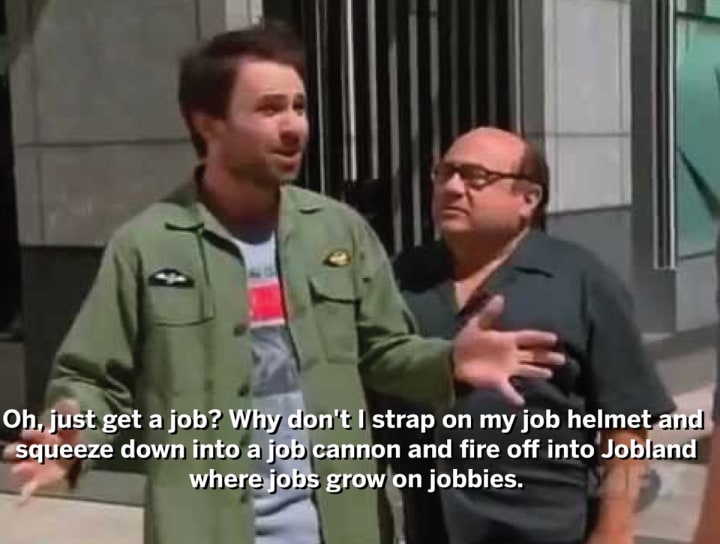Why Entry Level Jobs Are So Hard To Get?
Learn how many hoops you need to jump through just for a job

If you know, you know that securing an entry-level job has become increasingly challenging for fresh graduates and hard working people who are looking to start their careers. The traditional perception of entry-level jobs as a stepping stone to professional growth and success is a fading myth, as employers raise the bar for qualifications and experience to levels college graduates are not even close to achieving.
But why is that? Why are entry-level jobs so hard to get and is such an absolutely discouraging experience? In this article, we will explore the various factors that contribute to the difficulty of obtaining entry-level positions and shed light on the challenges faced by job applicants in their quest for employment.
Oversaturated Job Market
One of the primary reasons entry-level jobs are hard to come by is the oversaturation of the job market. With a large number of graduates entering the workforce every year, the demand for entry-level positions often exceeds the available job openings.
This results in a highly competitive environment that leaves many qualified candidates struggling to secure employment. In addition, the rise of online job portals has made job opportunities more accessible, leading to a large influx of applications for every advertised position imaginable.

As a consequence, employers are now being more selective and are setting higher criteria for entry-level roles. They can afford to be picky about the skills and experience they seek in candidates, even for positions that were previously considered open to those with minimal work experience.
We even see this in some our most favorite television shows and movies. FX’s The Bear shows a clear example of job recruiters being extremely picky over the most tiniest detail. When Richie and Sugar are interviewing for servers, Richie immediately dismisses one of the candidates primarily because she failed to recognize the improper placement of a napkin and a fork. While all of the server’s answers highlights her experience, her fate was literally dependent on miniscule impromptu test.
Increasing Educational Requirements
Over the years, employers have started raising the educational requirements for entry-level positions. What once required a high school diploma may now demand a bachelor’s degree or higher. This shift is partly due to advancements in technology, the growing complexity of job roles, and the expectation that everyone already has a bachelor’s degree.
As a result of this, job applicants with bachelor’s degrees now have to compete for positions that were previously open to those with less formal education. Of course, this would eventually push out those with no college education, making it difficult for everyone around to acquire a basic entry-level job.

While this trend is not universal across all industries and job sectors, it has become more evident in fields where postgraduate academic degrees are now treated what bachelor’s degree were 50 years ago. This is likely due to many employers believing that candidates with higher education are more suited to tackle the challenges of the modern workplace. However, it has gone to the point where you need a master’s degree just to work as a receptionist.
The fact that many sitcoms such as Broad City, It’s Always Sunny in Philadelphia, and even Seinfeld featured characters and episodes that highlight and satirize this struggle shows how ridiculous the education level one needs in order to secure and work a entry-level job.
Experience Conundrum
While entry-level jobs are meant to be the starting point for one’s career, many employers are seeking candidates with a considerable amount of work experience. This creates a Catch-22 situation for fresh graduates who are unable to gain experience without being given an opportunity first.
The fact that internships and part-time jobs have become vital to bridge this gap is extremely discouraging, because everyone who didn’t had access to such opportunities or knowledge back in college, now have to pursue them after they graduated. With majority of graduated students tackling student debt, they cannot afford to interview and work for unpaid internships.
The 2022 film, Emily the Criminal, perfectly showcased this frustrating reality as Aubrey Plaza played a character who gets locked out of her career path because of her debt, inexperience, and a minor criminal record. The moment she learned that her one career breakthrough was dependent on working for a woman who had an outdated perception of the workforce for free is what pushed her over the edge and pursued a life of crime.
AI & Automation
Even if candidates with an absurd amount of experience have what it takes to get an entry-level position, the rise of automation and artificial intelligence in the workplace has led to the elimination of a number of entry-level roles. As tasks once performed by humans can be easily done with a simple click of a button, businesses in every sector are incorporating AI software to bring their costs down.

We’ve all heard and seen how companies like McDonalds and Amazon are automating minimum wage jobs, but now we are seeing this leeching into more technical and creative fields. The WGA Strike is a perfect example of how writers in the entertainment industry worry about being replaced by AI and how it is going to make it harder for new writers to join the industry. As the rise of automation continues to reduces the number of available positions, its going to further increase competition for those that remain.
Economic Factors
Economic fluctuations and recessions always significantly impact the job market, making entry-level job hunting even more challenging. During economic downturns, companies may freeze hiring and even downsize their existing workforce, leaving fewer job openings available for recent graduates and inexperienced job seekers.

The 2008 recession and the 2020 pandemic have drastically reduced the number of entry-level positions and while employers are slowly rebuilding their workforce to full capacity, many saw it as an opportunity to implement cost-cutting measures and rely on existing employees to take on additional responsibilities. In addition, with the gradual rise of the gig economy, many companies are open to hiring an army of freelancers if it means they can achieve the same quality of work at a drastically lower cost.
Lack Of Guidance & Career Counseling
Of course at the heart of most problematic issues, the lack of education and guidance is what prolongs and worsens this trend. Insufficient career guidance and counseling services can leave graduates feeling lost and unprepared to navigate the job market. This lack of support can result in poorly crafted resumes, inadequate interview skills, and a general lack of awareness about job-search strategies.
Most contemporary sitcoms within the past ten years has showcased characters who interview for positions within their career path and end up getting the position not because of what they learned from college, but what they were forced to do in order to get that position. Even today, more and more job applicants are starting to feel compelled to lie during interviews and on applications, because they feel that they need to stand out from the crowd.
Can You Believe It?
Securing entry-level jobs has become a daunting task for many job applicants due to a combination of factors. The fact that it is consistently highlighted in our pop culture shows how truly hard it is just to get started on one’s career path.

This uphill battle for financial stability is fought on a deep incline and is demoralizing to so many job applicants, that the only thing they can hope for is either finding a company that matches with what they are looking or faking it until they make it.
What do you think? If you liked what you’ve read then follow for more related content!
About the Creator
Jay Kobayashi
A starving writer from LA who aspires to be plagiarized one day. I like to write about academic pieces that identifies philosophy and psychology in pop culture, and sometimes random fun pieces that interests me or the algorithm!






Comments
There are no comments for this story
Be the first to respond and start the conversation.